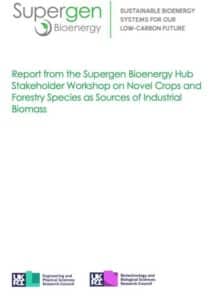 A recent Supergen Bioenergy Hub Stakeholder workshop focussing on novel crop species suitable for industrial-scale production of biomass in the UK has identified the most promising novel biomass crops for near-term deployment in the UK, as well as the key information needed to enable the sustainable deployment of novel biomass crops. The workshop focused on species that could be grown in the UK climate, suitable for industrial-scale production of bioenergy or bio-based materials; could be deployed at scale in the near term (< 5yrs); and are not yet being produced at scale in the UK.
A recent Supergen Bioenergy Hub Stakeholder workshop focussing on novel crop species suitable for industrial-scale production of biomass in the UK has identified the most promising novel biomass crops for near-term deployment in the UK, as well as the key information needed to enable the sustainable deployment of novel biomass crops. The workshop focused on species that could be grown in the UK climate, suitable for industrial-scale production of bioenergy or bio-based materials; could be deployed at scale in the near term (< 5yrs); and are not yet being produced at scale in the UK.
The comprehensive report, titled “Workshop Report on Novel Crops and Forestry Species as Sources for Industrial Biomass,” delves into the potential of these innovative sources, providing a roadmap for the future of bioenergy.
Hosted by the SuperGen Bioenergy Hub, the workshop convened leading experts, researchers, and industry stakeholders to explore and discuss the untapped potential of novel crops for industrial biomass production. The report, available for public access here, outlines key findings and recommendations that could reshape the landscape of bioenergy.
Novel Crops: A Paradigm Shift in Biomass Production
The report highlights the emergence of novel crops that exhibit remarkable potential as sources of industrial biomass. These crops, often characterised by high yields, rapid growth rates, and adaptability to diverse environments, could significantly enhance the efficiency and sustainability of bioenergy production.
Researchers emphasised the importance of diversifying biomass sources to mitigate environmental impacts and ensure long-term availability. Novel biomass crops such as energy grasses, black locust, paulownia, eucalyptus, hemp, cup plant, sphagnum moss and many others were identified and information was provided to sustainably deploy these novel crops in the UK.
Key Recommendations for the Future
The workshop focused on species that: could be grown in the UK climate; would be suitable for industrial-scale production of bioenergy or bio-based materials (i.e., not crops for the production of low-volume, high-value speciality products, such as direct production of pharmaceuticals); could be deployed at scale in the near term (< 5yrs); and are not yet being produced at scale in the UK
The key findings from the workshop included;
- Identification of 27 novel biomass crops considered suitable for deployment in the UK in the near to medium term.
- Need for basic agronomic knowledge of novel biomass crops and forestry species to facilitate the deployment of novel biomass crops.
- Limitation associated with the potential impacts of future climates on crop yields, and the environmental impacts of large-scale production on biodiversity and other ecosystem services such as soil health and carbon sequestration.
- Need for more agronomic trials, independent assessment of impacts on ecosystem services; exploration of the impacts of future climates; the development of new agronomic machinery; exploration of new markets and end-users; the development of pathways for upscaling the production of planting material; and crop breeding to ensure continual improvement of crop traits.
- Limited peer-reviewed research on novel biomass crops. Need for independent research and verification, especially in relation to the environmental impacts of large-scale production on a range of ecosystem services, including soil health and carbon sequestration, as well as biodiversity.
Download the full report here: Report from the Supergen Bioenergy Hub Stakeholder Workshop on Novel Crops and Forestry Species as Sources of Industrial Biomass



